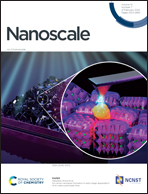A new approach towards the Debye length challenge for specific and label-free biological sensing based on field-effect transistors†
Abstract
Biologically-modified field-effect transistors (BioFETs) are promising platforms for specific and label-free biosensing due to their sub-micron footprint suitable for multiplexing in ultra-small samples, low noise levels, inherent amplification, etc. Debye screening length is a well-recognized challenge for any BioFET-based technology. The screening length is the smallest at the double layer, where the solution ion population is higher than the bulk population. One way to address the small double layer screening length is to electrostatically modify the potential drop across the solution such as to minimize the potential drop over the double layer. This will decrease the population of the double layer ions and increase the screening length. However, this is not possible with BioFETs as voltage application to the reference electrode simultaneously affects both the double layer and the BioFET conducting channel. The current study addresses the screening length challenge with the novel Meta-Nano-Channel (MNC) BioFET. The MNC BioFET, which is fabricated in a complementary-metal-oxide-silicon (CMOS) process, allows decoupling of the electrostatics of the double layer from the electrodynamics of the conducting channel. The study explores the mechanism of sensing with the MNC BioFET, and demonstrates how the double layer can be electrostatically tuned in order to optimize the screening length without affecting the conducting channel. Finally, specific and label-free sensing of 10 ng ml−1 prostate specific antigen (PSA) is demonstrated. It is shown that by electrostatically increasing the double layer screening length, the sensing signal increases from 70 mV to 133 mV.



 Please wait while we load your content...
Please wait while we load your content...